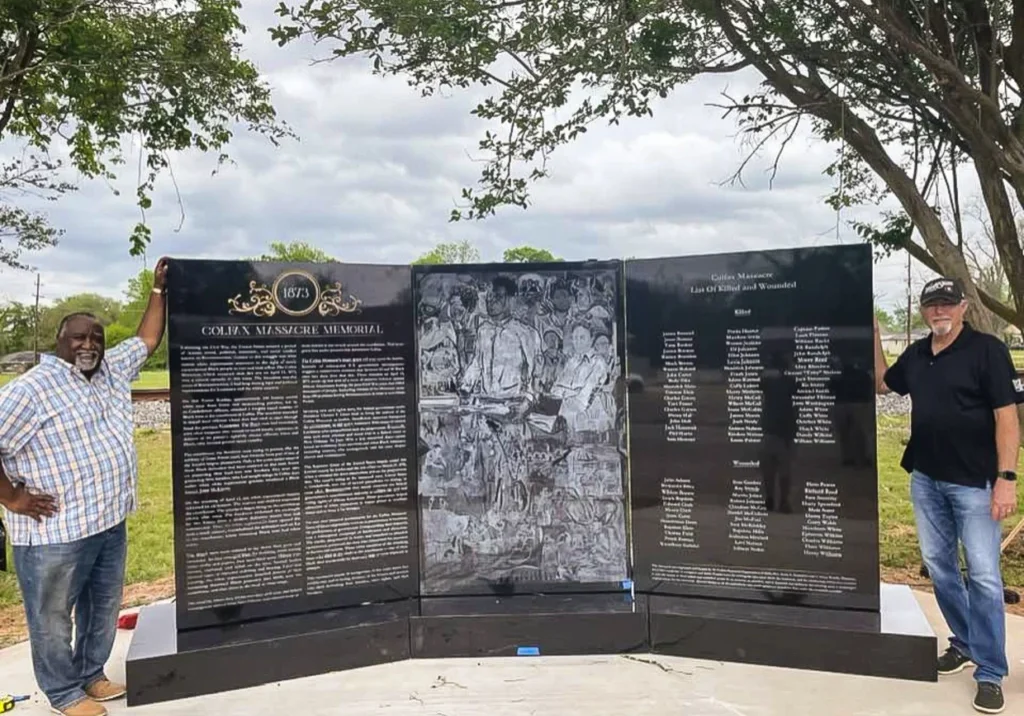On April 13, 1873, a heavily armed mob of white men in Colfax – the seat of Grant Parish – overran and slaughtered a smaller group of Black men who were defending the local courthouse and the officials they had helped elect. It was the bloodiest incident of Reconstruction, but for decades the Colfax Massacre was memorialized with a marker that called it “the end of carpetbag misrule in the South.” On Thursday, Gov. John Bel Edwards will join the Colfax Memorial Organization to dedicate a new memorial to the victims of that massacre. As The Washington Post’s Charles Lane reported in 2021, it would not have happened without the determined efforts of Mandi Mitchell, a former assistant secretary of Louisiana Economic Development who now heads up economic development efforts in Lafayette.
A Black Louisianian (and new mother), Mitchell, 44, determined that LED was the sole legal owner of the marker. Therefore, the LED could uproot it without prior approval from Grant Parish authorities, even though the parish owns the small patch of ground on which it stood. Invited by Cephas Bowie Jr., 67, the only Black member of the parish’s eight-member local council, Mitchell went to Colfax on March 11 to lay out LED’s plans to remove the sign, calling it a blot on the state’s image that “we could not have on our conscience.”
The story is a helpful reminder that government is comprised of people – and that sometimes the right person can make a big difference.
Teacher vs. police pay raises
The Louisiana Legislature appears far more interested in awarding pay raises for police officers than for public school teachers and support staff. A Senate committee on Wednesday agreed to a $1,200 annual increase in state “supplemental” pay for local police, firefighters and other first responders. On the other side of the Capitol, members of the budget-writing House Appropriations Committee pushed back against Gov. John Bel Edwards’ plan to give teachers a $2,000 raise. The Advocate’s James Finn reports that lawmakers appear to favor a competing pay plan brought by the Board of Elementary and Secondary Education:
That board wants the legislature to fund $2,000 across-the-board teacher raises, plus a pool of money from which to draw additional $1,000 raises for teachers in areas of high need. Offering $1,000 pay hikes to select teachers is sure to spark controversy, since both the governor and the state’s two teacher unions traditionally oppose such measures amid concerns about fairness. The BESE proposal, which [State Education Superintendent Cade] Brumley called “more market responsive” than the governor’s proposal, drew support from Appropriations Committee Chairman Rep. Jerome “Zee” Zeringue, R-Houma, who has said he is concerned about the return on investment of teacher raises approved in past years.
The New Mexico model for early childhood
New Mexico used $436 million in federal Covid-19 relief to greatly expand access to early child care. But leaders were left wondering how to sustain those improvements when the federal dollars eventually dried up. The solution came last November, when voters in the Land of Enchantment approved a ballot measure to make early care and education programming a constitutional right in the state. The new services will be paid for by drawing on a state trust fund made up of oil and gas revenue. Brookings’ Gabriel R. Sanchez and Carly Bennett explain how New Mexico’s early childhood amendment should serve as a model for other states:
From this amendment, funding is able to expand access to pre-K in New Mexico by 40%, with the inclusion of an increase in instructional hours for select programs, an expansion in the number of seats in classrooms, and a pay raise for early childhood workers. … New Mexico has provided a model for other states, and we strongly urge others to consider following their lead to expand early childhood access for young families. This has included building the infrastructure needed to accommodate an expansion of services through the creation of a new state department for early education and care that will help ensure that the expanded funds are able to be translated into programming. Although there is a lot of work ahead, the decades-long push to pass a constitutional amendment to expand early childhood funding will help countless families in New Mexico achieve economic mobility.
In Louisiana, a proposed $52 million investment in early care and education won’t cover a $200 million shortfall left by the expiration of federal funding. More than 16,000 children will lose access to these essential programs if lawmakers do not replace these dollars.
Tennessee’s legislature is broken. It’s not alone
The Tennessee Legislature’s decision to expel two Democratic lawmakers for their gun control advocacy is a symptom of a broader national problem with state government. The factors that drove the expulsion – partisan division, gerrymandering and an urban-rural divide and uncompetitive races – aren’t limited to the Volunteer State. The New York Times’ Michael Wines explains:
The lack of competition means incumbent lawmakers face few consequences for their conduct. And their legislative actions are driven in large part by the fraction of partisans who determine their fates in primary elections, the only political contests where they face serious opposition. Those forces, intensified by the Supreme Court’s open door for gerrymandering and the geographic sorting of Democrats into urban areas and Republicans into rural ones, are buffeting legislatures run by both parties: Republicans have total control of legislatures in 28 states (including Nebraska, which is nominally nonpartisan) and Democrats in 18.
Louisiana’s Legislature has taken on a more partisan hue in recent years, but still hasn’t delved into America’s culture wars with the same frequency and ferocity as other states.
Number of the Day
$2.5 million – Amount of money that is lost in Louisiana tax and royalty revenue because of venting, flaring and leaks of methane by oil and gas operators. (Source: Environmental Defense Fund)
